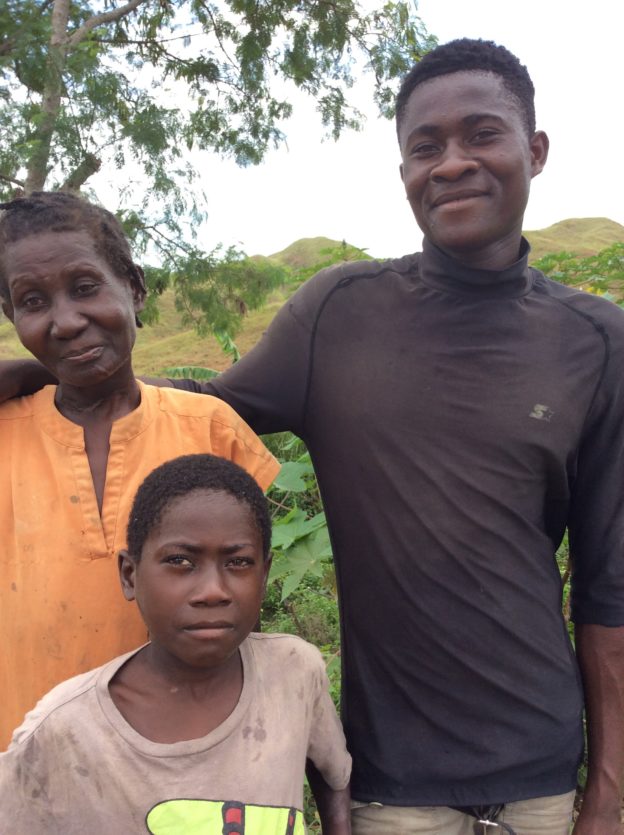Rosemène Achil lives in Bozyo, a sparsely populated agricultural area in the lower, southern side of Boukankare. Bozyo is dotted with small, grass-covered hills, with narrow dirt paths that lead between and around them. Its homes are scattered through these hills, some on hilltops and others hidden away in the little nooks the hills provide.
Rosemène’s is hidden, at least a hundred yards from her closest neighbor’s. She lives there with four of her children. She had seven, and lost two. One of the surviving five – her oldest living daughter – lives with another family. She owns no land, but has a cousin who let her put up the shack on his. He even agreed to let her construct her new CLM home on it.
She joined the CLM program in 2009, immediately after the end of the successful pilot. At the time, she was living in a broken-down shack that provided no protection from the tropical rains. Her husband was with her then, and the couple lived on what he sometimes earned for a day’s work in a neighbor’s field. Her son Isnat, who was a teenager at the time, would help too. He would recognize sometimes that his mother had nothing to feed him and his younger siblings, so he’d go find work. The adults he’d work for could be slow to pay him, though. They still thought of him as a child.
The program gave her goats and a collection of poultry, and she struggled with the poultry. “I don’t eat eggs. It’s not something I grew up with. And you can’t raise the young poultry because the animals around here eat them all.”
But Rosemène had success with the goats. She took good care of them with her boys’ help, and they had young. She used the young, along with savings from her weekly cash stipend, to make other investments, though it wasn’t easy. She always needed some of the stipend to feed her kids, and had a hard time protecting the rest of it from her spendthrift husband. He would pressure her to him money as soon as her case manager, Lissage, had finished his visit. She’d have to argue or lie to keep him from wasting it. Eventually, she arranged with Lissage for him to hold on to it, depositing it in her savings account for her. She didn’t know what else to do.
When she graduated from the program in December 2010, she still had her goats, but she also had a fertile sow and a young heifer. She says that her case manager bought them for her though she knows that he bought it with her money. Almost six years after graduation, her livestock is still flourishing. Her cow was nursing its second calf and her pig had proven a reliable source of income.
But that points to Rosemène’s continued vulnerability, because one of her husband’s children took the bull and sold it. He spoke vaguely about having just “borrowed” the animal, but has shown no sign of a plan to replace it. And she can’t speak to her husband about it, because he has disappeared. Rosemène has been unable to assert her authority over the assets she’s worked to build up, and a reduction in her livestock holdings is dangerous because they are her only source of income other than the little her boy can earn.
Part of the problem is that she cannot establish a small commerce. Activity at the local markets would normally be the obvious way for a woman like Rosemène to generate a regular income. She would depend on livestock to manage larger expenses but use commerce to manage the day-to-day. But Rosemène “pa konn lajan. ” That means that she doesn’t “know money”. Haitians say this about two kinds of people. Some have trouble distinguishing between bills of different denominations. Others can’t do the arithmetic that making change requires. In any case, she and her case manager judged that small commerce would not work for her.
So Rosemène’s progress remains fragile. Her economic situation is much improved since she joined the program, but she has very little margin. This year, for example, her children are not in school because her husband wasted the last litter of piglets she had been counting on to cover the expenses. And psychologically, she’s fragile, too: She still understands the progress she’s made as something Lissage did for her.
But there’s reason for hope nonetheless. Lissage is committed to investing the time necessary to help her get through the trouble with her husband and his family, even six years after graduation. He’s helping her start legal proceeds against the man’s son to recover price of the bull. And Isnit is increasing showing signs that he feels himself ready and able to be the partner his mother needs to ensure the future of her younger kids.
And her view of herself has changed. The same woman who had to beg her cousin for a spot to put up her shack was proud that she was the one to finance her uncle’s funeral. She sold a large sow, replaced it with a much younger one, and used the difference in price to buy funeral supplies.
